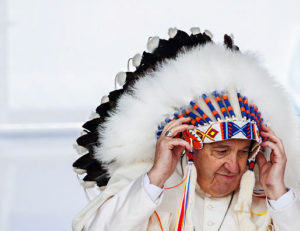It might seem perverse to describe the death of a painfully frail 95-year-old man as a uniquely sad event. But in the case of Pope Emeritus Benedict XVI we have to consider the poignant and unsettling circumstances in which he died.
I was in St Peter’s Square on 10 April, 2005, when the words “Josephum Sanctae Romanae Ecclesiae Cardinalem Ratzinger” boomed out from the loudspeakers. It was an electrifying surprise. Pope John Paul II’s Bavarian-born doctrinal chief was on everybody’s shortlist, but his reputation as the old pope’s “Rottweiler” marked him out as a partisan candidate. Not for one moment did I think the cardinals would choose him.
Well-informed Catholics knew that Ratzinger was, in fact, one of the most important theologians in the 2,000-year history of the Church. His argument that acts of sacramental worship transcended time and space emerged from an imagination endlessly refreshed by art and philosophy. But his mission to refresh the Church by recovering sacred traditions was not compatible with any change of teaching on women’s ministry or sexual minorities. Therefore many liberal Catholics — including those who were uncomfortably aware that the new Benedict XVI was the most intellectually gifted pope for centuries — made apocalyptic predictions about the coming Rottweiler papacy.
Benedict did not oblige them. Having been obliged to play the role of doctrinal enforcer by Pope John Paul, he decided to govern as a pastor and scholar. Indeed, there’s no doubt that his passion for writing interfered with his effectiveness as pope. He retreated into his study to write a biography of Jesus of Nazareth while senior curial officials swanned around the Vatican like elderly playboys in Dubai, using the contents of the world’s collection plates to buy sex and launder money. He did not attempt to conceal the activities of sex abusers in the Vatican, but his disciplinary actions were ineffective. When he discovered that the retired Cardinal Theodore McCarrick of Washington was a serial abuser of seminarians, he told him to retreat to a life of prayer and then did nothing when “Uncle Ted” ignored him.
The lapidary beauty of Benedict’s encyclicals, in which he sought to capture the purifying essence of Christian love, was hard to reconcile with the debauchery of some of the world’s most influential cardinals, described in a torrent of leaks to the media.
At some point in 2012 Benedict decided that he did not have the physical strength to reform the Vatican. On 11 February 2013, he gathered together his cardinals and told them — characteristically in Latin — that he was resigning the See of Peter. He was the first pope to resign since Celestine XVI in 1294.
The shock was overwhelming, especially for traditionalist Catholics. They believed that, by removing restrictions on the celebration of the ancient Latin Mass in 2007, Benedict XVI had healed wounds created by the infantile worship forced on them since the Second Vatican Council. Ratzinger had been a theological adviser to the Council. He never repudiated its emphasis on a more accessible and open-minded evangelisation, but he came to loathe the ‘Year Zero’ philosophy of progressive Catholic who seemed to believe that Christianity itself had been reinvented at the Council.
Benedict must have been confident that his successor would develop what he called his “hermeneutic of continuity”, which reintegrated the Latin Mass and its music into the life of the Church. This rebalancing of Catholicism was essential, he believed, as a corrective to the political and cultural fashions that increasingly preoccupied liberal Catholics after the Council.
But the pope-scholar miscalculated. He seems to have hoped that the See of Peter would be occupied by Cardinal Angelo Scola, Archbishop of Milan, a moderate conservative committed to dialogue with other faiths but firmly opposed to changes to Catholic teachings on sexual morality. Instead, the cardinals — sickened by revelations of cocaine-fuelled orgies and Mafioso bribery inside the Vatican — voted for the Jesuit Cardinal Jose Mario Bergoglio of Buenos Aires, who promised (but never delivered) fundamental changes to the Church’s government.
The new Pope Francis ostentatiously dispensed with some of the papal trimmings that Benedict loved; there would be no more red shoes, and he swiftly withdrew his hand from anyone who tried to kiss the ring on his finger. He cultivated Left-wing journalists who obligingly portrayed him as a humble yet charismatic reformer.
Meanwhile, Benedict shut himself away in a monastery in the grounds of the Vatican, no longer pope but still wearing a modified version of his white cassock and adopting the deeply confusing title of His Holiness Benedict XVI, Pope Emeritus. On rare occasions he would write an essay or book introduction that appeared to criticise some innovation, such as the abolition of compulsory celibacy for Latin-rite priests, that Francis was encouraging the world’s bishops to debate.
But for the most part he kept his promise of silence, and there is not a single recorded instance of Benedict criticising Francis. Therefore we can only guess how the former pope reacted when his successor began to dismantle his legacy.
From the moment he became pope, Francis encouraged the Church to debate sensitive and divisive topics. As a result, the world’s cardinals were dragged into factional infighting over questions — such as women’s ordination and blessings for gay couples — that Popes John Paul and Benedict had assured them were settled for all time.
Curiously, Pope Francis always stepped back from the brink of changing the Church’s teachings, though he allowed Catholics to infer that the official line could be ignored in practice. But, eight years into his papacy, he did make one ruling that could have been designed to inflict acute humiliation on his frail predecessor. In 2021, without warning, Francis issued a partial but arbitrary and savage ban on many celebrations of the traditional Latin Mass.
Benedict said nothing, just as he remained silent while evidence accumulated that his “reforming” successor had a track record of protecting his personal allies from allegations of sexual abuse. He could not do so without breaking his vow of silence and thereby encouraging Catholic conspiracy theorists who believed that Benedict had never really resigned.
Of course, Benedict had only himself to blame for this rumour. Even among conservative cardinals there was a consensus that he should have reverted to his original name and dressed in black, not white. There was an even stronger consensus that Pope Benedict should not have resigned as early as he did. But that, of course, was informed by the wisdom of hindsight.
Few people expected Bergoglio, a front-runner in 2005, to succeed in 2013, and even fewer expected Francis’s pontificate to re-open so many of the wounds that Benedict tried to heal in an unexpectedly gentle and tactful manner. (If Catholic journalists had done some detailed research into Bergoglio’s oddly tormented relationship with the Church in Argentina, they might have predicted some of the ensuing chaos, but they chose not to.)
The sorrow at Benedict XVI’s death and the celebration of his pontificate will therefore be muted; many conservative Catholics will be distracted by their efforts to suppress their anger at what they have come to think of as the self-pitying folly of his resignation.
In 2005, they witnessed an apparent miracle. The author of a series of intellectual masterpieces that offered Catholics a luminous glimpse of restored worship was elected Supreme Pontiff. Eight years later this same theological genius left the See of Peter in a helicopter, having allowed himself to be crushed by the responsibilities of his office. And then the Catholic Church fell apart. Whose fault was that?
We can be certain that Joseph Ratzinger asked himself that question many times; perhaps every day during a retirement that lasted almost a decade. What we will never know is how he answered it.
Disclaimer
Some of the posts we share are controversial and we do not necessarily agree with them in the whole extend. Sometimes we agree with the content or part of it but we do not agree with the narration or language. Nevertheless we find them somehow interesting, valuable and/or informative or we share them, because we strongly believe in freedom of speech, free press and journalism. We strongly encourage you to have a critical approach to all the content, do your own research and analysis to build your own opinion.
We would be glad to have your feedback.
Source: UnHerd Read the original article here: https://unherd.com/




